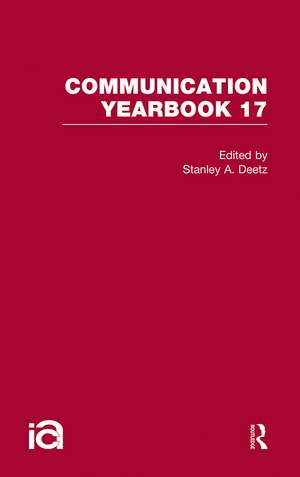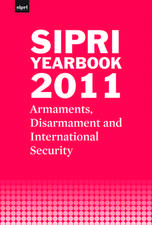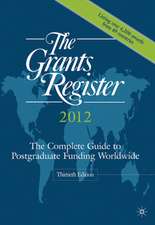Communication Yearbook 17
Editat de Stanley Deetzen Limba Engleză Paperback – feb 2022
| Toate formatele și edițiile | Preț | Express |
|---|---|---|
| Paperback (1) | 432.99 lei 6-8 săpt. | |
| Taylor & Francis – feb 2022 | 432.99 lei 6-8 săpt. | |
| Hardback (1) | 502.10 lei 6-8 săpt. | |
| Taylor & Francis – 25 oct 2011 | 502.10 lei 6-8 săpt. |
Preț: 432.99 lei
Nou
Puncte Express: 649
Preț estimativ în valută:
82.86€ • 86.19$ • 68.41£
82.86€ • 86.19$ • 68.41£
Carte tipărită la comandă
Livrare economică 15-29 aprilie
Preluare comenzi: 021 569.72.76
Specificații
ISBN-13: 9781032243177
ISBN-10: 1032243171
Pagini: 642
Dimensiuni: 152 x 229 x 33 mm
Greutate: 0.85 kg
Ediția:1
Editura: Taylor & Francis
Colecția Routledge
Locul publicării:Oxford, United Kingdom
ISBN-10: 1032243171
Pagini: 642
Dimensiuni: 152 x 229 x 33 mm
Greutate: 0.85 kg
Ediția:1
Editura: Taylor & Francis
Colecția Routledge
Locul publicării:Oxford, United Kingdom
Cuprins
Section 1: Communication and Identity: Construction of the Personal and the Social 1. Social Construction: Knowledge, Self, Others, and Continuing the Conversation John Shotter and Kenneth J. Gergen Commentaries: Recovering Agency W. Burnett Pearce Social Constructionism and Communication Studies: Hearing the Conversation But Losing the Dialogue Hugh Willmott 2. Is There Still A Problem About the Self? Rom Harré Commentaries: Relationally Engendered Selves Hartmut B. Mokros and Margaret A. Carr Discursive Practice and Legitimation of the Polymorphous Self Martha Cooper and Anne Gravel 3. Culture, Ideology, and Interpersonal Communication Research Kristine L. Fitch Commentaries: The Problem With Disempowering Ideology John W. Lannamann The Contested Spaces of Cultural Dialogue Mark Neumann 4. Personhood, Positioning, and Cultural Pragmatics: American Dignity in Cross-Cultural Perspective Donald Carbaugh Commentary: Recovering History and Conflict Gordon Nakagawa 5. Narratives of Individual and Organizational Identities Barbara Czarniawska-Joerges Commentaries: Articulating Identity in An Organizational Age Lars Thøger Christensen and George Cheney Organizational Narratives and the Person/Identity Distinction Barbara Levitt and Clifford Nass 6. Communication and Interdependence in Democratic Organizations Teresa M. Harrison Commentaries: Dialogue as Democratic Discourse: Affirming Harrison Eric M. Eisenberg "Wego" Comes in Several Varieties and is Not Simple William I. Gorden Section 2: Taking Messages Seriously 7. Discourse Features and Message Comprehension Diane M. Badzinski and Mary M. Gill Commentary: Codes and Pragmatic Comprehension Donald G. Ellis 8. Embodied Health and Constitutive Communication: Toward an Authentic Conceptualization of Health Communication Eric G. Zook Commentary: An Invitation to Leap from a Trinitarian Ontology in Health Communication Research to a Spiritually Inclusive Quatrain Maria Cristina González 9. Once More, With Feeling: Reconsidering the Role of Emotion in Work Vincent R. Waldron Commentary: Is Emotional Expression Repression Oppression? Myths of Organizational Affective Regulation Charles Conrad and Kim Witte Section 3: Media, Culture, and Diversity 10. Does TV Belong in the Classroom? Cognitive Consequences of Visual "Literacy" Paul Messaris Commentaries: Pedagogical Issues in the U.S Media Education Renée Hobbs Coming to Terms With Television Aimée Dorr 11. Market Censorship Revisited: Press Freedom, Journalistic Practices, and the Emerging World Order Sue Curry Jansen Commentary: Communication Technology as a Metaphor of Power John J. Pauly 12. Interethnic Communication: The Context and the Behaviour Young Yun Kim Commentaries: Deconstructing the "Big Picture": Perspectives and Layers of Interethnic Communication Richard Clément and Howard Giles Interethnic Communication and Cross-Paradigm Borrowing: A Disciplinary Response Vernon E. Cronen Section 4: Editor’s Postscript 13. Future of the Discipline: The Challenges, the Research, and the Social Contribution Stanley A. Deetz
Descriere
Divided into four sections, the first part of Communication Yearbook 17 focuses on interpersonal interaction, and is intended to complement the mass media focus of Communication Yearbooks 15 and 16. The second section focuses on message characteristics and what messages do in interaction. Section III considers value and policy issues





